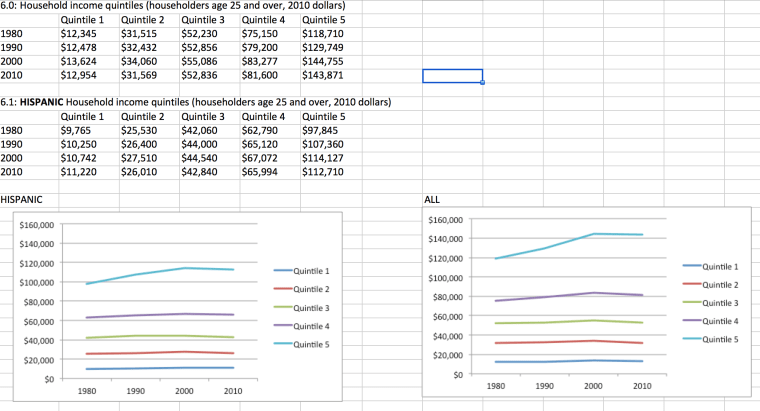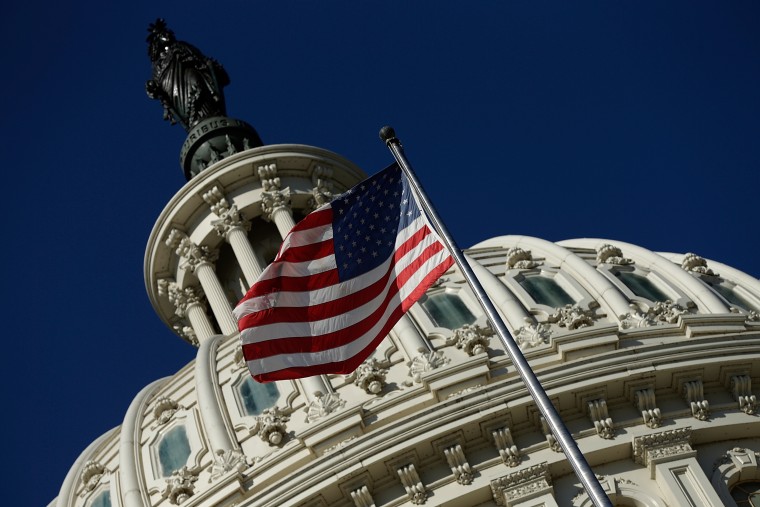CHICAGO – What class are you: Middle-, upper-, lower-class? Let’s look at this same question another way: Are you “raza” or “true gente”? Or or you an elite sell out, also known as a LINO – Latino In Name Only?
How you answer may have everything to do not only with how much money you make, but how you see yourself and who you choose to align yourself with in an increasingly polarized society.
First and foremost, one thing is certain: Hispanics mirror the economic trends of society as a whole, even though some of those trends experience a lag, and because of this, there is no one “authentic” economic experience. As it is so in any other demographic group, Hispanics are rich and poor, ultra-liberal and ultra-conservative and everything else in between.
What’s different now, however, is that though there are Hispanics surviving and even thriving across all segments of society, widening inequality gaps are playing out across all demographic groups in the United States – and making news headlines daily.
As political polarization pushes people into different camps based on their economic outlook, will more divisions emerge among Hispanics along socioeconomic – rather than the old national identity – lines?
Is someone more "Hispanic" than another based on socioeconomic or political lines?
Look no further than Chicago this past February, where the lead up to the city’s historic mayoral election runoff between Rahm Emanuel and opponent Chuy Garcia, a relatively unknown county administrator, saw the city’s Democrats break off into two camps: The progressive wing, focused on issues related to inequality and the so-called corporate wing, which favored strong political leadership and partnership with entities that promise to improve the city’s overall economy.
The tug-of-war which ensued pitted a diverse group of monied interests against teacher-union backed grass-roots activists that ended up seeming to some as an epic battle between “sell-out Hispanics” - like top Latino elected officials standing with Emanuel - and the “true gente," those who supported Chuy Garcia and his push for higher minimum wages and progressive agenda items.
In its ugliest moments, the battle saw a beloved Chicago journalist, WTTW’s Phil Ponce, denounced as a “Latino elitist” because of his tough questioning of candidate Garcia on the topic of Garcia’s son, who has a history that included alleged gang violence and brushes with the law.
How the incident infuriated people was telling. Some were simply disgusted that a candidate’s family was dragged into the scrum.
But others were outraged that Ponce – who is well known to be a close neighbor of Emanuel’s in a tony area of the city known for its safety, beauty and pricey real estate – seemed to be equating living in a poor section of town with few resources as a character flaw that produces unavoidably negative outcomes. Still others were surprised that Ponce was being harassed for jumping to what they saw as a reasonable conclusion.
Ponce ultimately apologized for his tone-deafness, conceding that even parents bringing their children up in the best circumstances can have children with issues. But the incident brought to the fore the question of whether an already diverse Hispanic community can count socioeconomic status as the newest fault line.
Unfortunately, it’s difficult to determine shifts in income classes in the Latino community because not much research has been devoted to the study of how Hispanics fill out the income spectrum.
Writing in her 2008 book, “Latino Spin: Public Image and the Whitewashing of Race,” author Arlene Davila, professor of anthropology and American studies at New York University, said that there is an orthodoxy “that true Latinos are always liberal, poor, needy, etc.” and that the only reason such biases were finally being overcome in academic research is the influx of middle-class Latino researchers, journalists and “Latinologists speaking for or on behalf of Latinos.”
Seven years later we’re certainly not there yet, but the very fact that I have the privilege of writing about this subject for NBC speaks to the fact that we’re at least a little bit beyond the state of things that Davila described as “a dearth of scholarly attention in the documentation and research of issues related to class differentiation among Latinos. This in sharp contrast to the African-American studies literature, where the black middle class has been the subject of more consistent scholarly attention…In general, if Latinos and class were discussed, it was the working class, if not the poor, that was assumed to be the norm.”
In reality, the economic norm for Hispanics, according to Marybeth J. Mattingly, a research consultant at The Stanford Center on Poverty and Inequality, is to mirror the white population, albeit with a bit of lag.

“Hispanics followed the same trends as the overall population, but the levels are much lower,” Mattingly told me. “The proportions stay close but these are overall national trends. This doesn’t account for Hispanics who are new populations in rural settings vs. those living in established communities in big urban areas. This is a one-frame snapshot. On the ground the stories are more nuanced but the national story speaks to the broader issue of Hispanic disadvantage: some places do well and other places do horribly.”
To that point, the U.S. Census Bureau estimates of poverty rates for the Hispanic or Latino population by state from 2007 to 2011 say that Tennessee, North Carolina, Kentucky and Arkansas are the states with the highest concentration of Latinos living below the poverty line.
By comparison, Alaska, Hawaii, the District of Columbia and the state of Virginia are the places to find the smallest concentrations of Hispanics living below poverty.
And, of course, we can’t forget the income differences based on nationality.
A Washington Post article which noted “America's Hispanic population might offer one of the clearest examples of the country's widening wealth gap,” showed data in which Argentinians exceed the national median household income by several thousand dollars while Puerto Ricans, Hondurans and Dominicans make tens of thousands less than the median.
All that said, it must be pointed out that although inequality is a hot topic in the news right now, it has always been a hot topic among Latinos.
“Right now the biggest issue I see is that the media have a love affair with the upwardly mobile Latino on one hand and the prototypically poor on the other. We have Ted Cruz and Marco Rubio as the embodiment of the American Dream on one end and the uneducated, unhealthy poor masses on the other, leading to more generalizations,” Davila told me in a recent interview.
“In truth, inequality plays itself out among Latinos – it's not a new development,” Davila continued. “We have Latino class distinctions, and the distinctions between the 2nd and 3rd generation have a lot to do with class – that’s always been there. The issue is whether we’re now seeing those distinctions playing out more, and that has to do with the political climate. Maybe what you’re seeing has more to do with political alliances than with class, per se.”
Fair enough.
But it’s not too much of a stretch to say that, for instance, the 700,000 or so Latinos living in Washington, DC and surrounding areas with a median household income of nearly $61,000 - the highest in the country among Latinos – will have more in common with the wealthiest Hispanics in Miami, Houston and Riverside, California than they will with working class Latinos struggling to make ends meet in Laredo, Texas, Paterson, New Jersey or Elgin, Illinois.
This widening inequality – whether it mirrors the general population or not – and the tensions it might put on already fragile coalitions between different national and political groups in communities across the nation are worth taking into consideration. Not least of which because if there’s any community that needs to find more and increasingly powerful ways to come together to uplift ourselves and boost economic and social mobility, it’s Hispanics.
But the issue demand our consideration. What if our upcoming presidential contest has the potential to cleave families and friends between a progressive Democrat candidate and a potentially history making Hispanic Republican? Is a Republican Latino less "Hispanic?"
Though Latinos may be able to identify with many different classes, it would be a shame if heated politics lead us to use ugly labels like “sell out” or “true gente” to attack each other’s identities based on where our financial, political or idealistic sensibilities lie.
We already have so many voices tearing us down, can we really afford to turn on each other, too?
